Today is my 17th wedding anniversary with the Darling Husband, so I thought it would be fun to do another installation of Pink & Ginger, in which we talk about what’s made this partnership work for so long.
You can read more about our backstory elsewhere on the blog, but we’ll start at the beginning here:
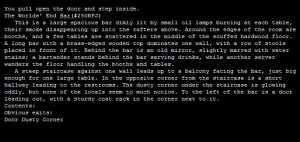
The Worlds’ End Bar on AmberMUSH, where the DH and I first met. For real.
ProfBanks: So, Mr. Banks, when did you decide you wanted to marry me?
Darling Husband: Oh good, we’re starting with the easy ones.
It’s a toss-up between the time you killed my character on AmberMUSH with random dice rolls, and when you sent me that first mix-tape that was totally spot-on perfect.
But like every relationship’s beginning it’s the sum of all of its parts. Kind of unfair to single out.
PB: I can’t remember the exact day, but there was a point in the fall of ’95, when we were making plans for your visit, that I turned to Mari and said, “Hah, wouldn’t it be funny if I came back from Scotland married?” She looked at me like I’d lost my mind, but the little flip-flop in my stomach told me that, if you asked to elope, I’d do it in a heartbeat.

DH and me, celebrating my 21st birthday in France, in all our ’90s splendor.
PB: I’m sure it must’ve been like watching a bizarre, incomprehensible rom com unfold over the year. Add that to the generally weird experience of living abroad with a group of Americans (and Dutch), it had to have been the best entertainment around.
DH: Plus the unpredictable hours and time differences! From time to time, there was the additional worry of, “Holy crow, she’s a million miles away in France. If anything were to happen, how would I get there in time?” There were a couple of occasions like that.
PB: I remember some of those. Honestly, though, I wonder sometimes whether we’d have moved along so quickly without that 12-hour time difference. It really greased the skids for what was probably inevitable, but never easy.
Do you ever think about how our relationship would’ve been if we’d had something like Skype? Or even just Internet with pictures?
DH: I imagine the outcome would have been quite different if we’d had Twitter. I see this with a lot of romances and couples nowadays. And not being able to constantly know what each of us were doing was probably a good thing, too.
PB: Well, actually, Twitter strikes me as much closer to what we DID have.
DH: I suppose. Maybe I’m talking about always-available smart phones.
PB: Oh that. Yeah, even just today’s long distance rates might’ve kept the urgency levels for being together lower.
So, what’s the best thing about being married to me?
DH: The absolute best thing is knowing that we have our own culture and shared intellectual & emotional space that nobody else has. It’s a hybrid that started up in the days of MUSHing and exists now with a thousand little in-jokes, references, interests, and hobbies. Even though we don’t do the same things all the time, I never get the “why does she do that?” thought that comes with, say, not understanding why you like Prince so much.

When DH makes fun of my love for Prince, doves cry.
PB: The Prince thing is easy—it’s because Purple Rain is the best thing ever. But yes, we’ve built this whole world and language and symbology that I find hilarious on a daily basis. And while I value that immensely, I also want to say that I appreciate the fact that we work pretty seamlessly as a team, and we’re rock solid when we do. I often feel like circumstances are overwhelming, but I never doubt that we’ll make it through.
DH: Yes. I think that’s emblematic of this shared life, though. It’s the foundation for why we can relax enough to enjoy that. Sometimes things are incredibly stressful for one or both of us, but I know laughter isn’t too far away—and if not laughter, at least a firm set of the jaw and a desire to kick some ass.
PB: “A firm set of the jaw and a desire to kick some ass” should be on my business card.
What’s one weird thing I do that you kinda love?
DH: There are a ton of things. One of them is the weird voices and sounds you do that accompany watching or acting out things. “Wahoo! Wahey! Whoopee!” as you watch cat fail videos, for example. It’s like you narrate life in a fun way.
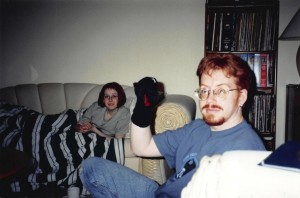
DH with a sock puppet of the Serpent of Chaos that I made for his birthday. Don’t try to understand it.
PB: It’s hard for me to choose, but I’d say I’m pretty enchanted after all this time by the Closet of Random Weirdness you can dial into. Nobody else does that quite like you, except maybe Eddie Izzard.
So, is there a quality about yourself that you think has been essential for building such a strong marriage? I know it’s not what you thought you were signing up for when we exchanged rings.
DH: I’ve said this fairly often in the past, but it’s a combination of being fiercely loyal and having a lot of willpower. That’s not to mean that sticking with you has required a force of will, but I’ve chosen to invest in something I believe has value and worth and is greater than myself, and so I will move heaven and earth to ensure that it’s held up.
I hope this also comes out in my parenting and my job, too, but really I think my surprise at anyone asking how I can be married for this long comes from “Well, what else did you expect me to do?” I made vows, I made a promise, and I entered into it willingly and without an expectation that it would always be roses and leafy garlands.
PB: Yeah, but fibromyalgia and a house full of neurodiverse people and a cat that’s determined to rid you of the ginger caterpillar on your upper lip? I can’t even say how many people would’ve run the other way.
DH: I suppose it’s a good thing I’m not those people? I mean, I’d be a sad dude. Plus nobody ever knows what’s going to come along. I think my whole life with you has been one of discovery in spite of the setbacks to health, finances, or geography.
PB: Well, with all the other baggage I’ve unwittingly brought into this relationship, I think the one thing that I have that makes it work is flexibility. That sounds weird, considering how often I freak out when things don’t go the way I wanted them to, but where it’s important, I’m pretty good at just rolling with it.
DH: Nobody could ever accuse you of being static. As a teacher, I think you appreciate the importance of always learning. You read a hundred times faster and more often than I do. It’s alarming, and it’s a thing I wish I was able to do. I think that part of my brain likes to just shut off. Or else it’s what my Mum always warned me would happen if I read too many comic books.
PB: Nonsense. I’ve always taken refuge in books and learning, not to say at all that you haven’t. But as much focus as I can summon for that, you can actually focus on a single project in a way I find difficult. I can’t turn off the multitasking enough to lay down a good stretch of track like you do. Plus, it helps that you’re ridiculously creative, so you just unspool ideas like no one I’ve ever known.
DH: It’s a blessing and a curse. It’s possible to get caught up in a rat’s nest of ideas and connections that I get the creative equivalent of falling down the Wikipedia rabbit hole. I think this is at least part of why my time management sucks so bad. I’ve got to get on top of that. Maybe I should start making lists like some of our efficient friends do? Only, I think I’ll probably just ignore them.
PB: Luckily, though, your time management doesn’t really have a giant effect on our marriage, except for the stress that it causes you. Honestly, I can cope with it by flexing stuff around it. No biggie.
So what’s the most annoying thing I do?

I’m not saying I’m like this in the kitchen, but kinda yeah.
DH: Probably how you can create amazing dishes, baked goods, or other food and leave the kitchen a titanic mess. Which you say you will clean up, but I usually can’t stand it long enough before I end up doing it. So, on the spectrum of annoying things spouses do, that’s pretty low.
PB: That’s true, though I’d like to make a plea that my mess wouldn’t be as big if I had more counter space. Don’t ask me how I think that would work, but I’m sure it would help.
DH: We would likely find a way to cover every surface in something, eventually.
PB: Face it: If it weren’t for you, we’d soon be snowed under completely by dirty dishes, homework, books, and crap. I’m so grateful for your willingness to pick up my slack on physical chores.
There aren’t too many annoying things about you that I can’t attribute to my hyper-tuned autism senses. And you always turn over to stop snoring when I shove your shoulder in the night, so that’s not a big thing.
Ironically, I think the most annoying thing is also the thing I most envy, which is your ability to filter out everything going on around you and get lost in what you’re doing. I’m completely unable to ignore the noise and motion of the kids, so I get frustrated sometimes that you don’t notice when I’m struggling to get them to do something. We’re so lucky that you can stay calm through that, though—I sure can’t.
DH: When it gets particularly annoying, it probably looks like I’m not paying attention. Which of course is totally an illusion, because I know what’s happening around me at all times.
PB: Bah, I say. Bah. All the bah.
DH: So do we have the secret to a successful marriage here?
PB: I don’t know what a secret it is. We laugh, we work together, we’re honest, we cover each other’s weak spots, we tolerate, and we make room for new ideas, priorities, and experiences.
DH: Plus we have these kids.
PB: Right. How weird is that.
If we could celebrate our anniversary in any way, with money as no object, what would you want to do?
DH: Fly back to Scotland. Spend time in Aberdeen again, then this time go the rest of the way up, and take a boat across to Ireland. Revisit places we were at before. Follow up with another New Zealand trip, or one to France, or Rome.
PB: With or without the kids?
DH: You know, if we could fly them in after a romantic weekend, that would be OK. But if money were no object, I’d drop them in the lair of a grandparent or two and ditch.
PB: That sounds nice. I’d even be content with something closer to home, like being able to buy ourselves really swanky clothes, then go out for a fancy dinner and a show of some kind, then spend the night in a comfy hotel.
DH: Yeah, those are the anniversaries I like. Just recognizing them with alcohol and time together.
I make us sound like drunks.
PB: Which is funny because I’ve never been drunk.
But since money is the only object we lack at the moment, what would you like to do tomorrow?
DH: We’re going to go out and get an early bite to eat before catching a 7:10pm screening of Don Jon, of course.
PB: Yeah, I could be down with that. You do know how ridiculously lucky I am to have had you for the last 17 years, though, right, Mr. Banks?
DH: Right back at you, sweetheart.
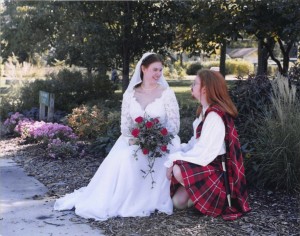
 Domestic Engineering
Domestic Engineering  1 Comment
1 Comment 




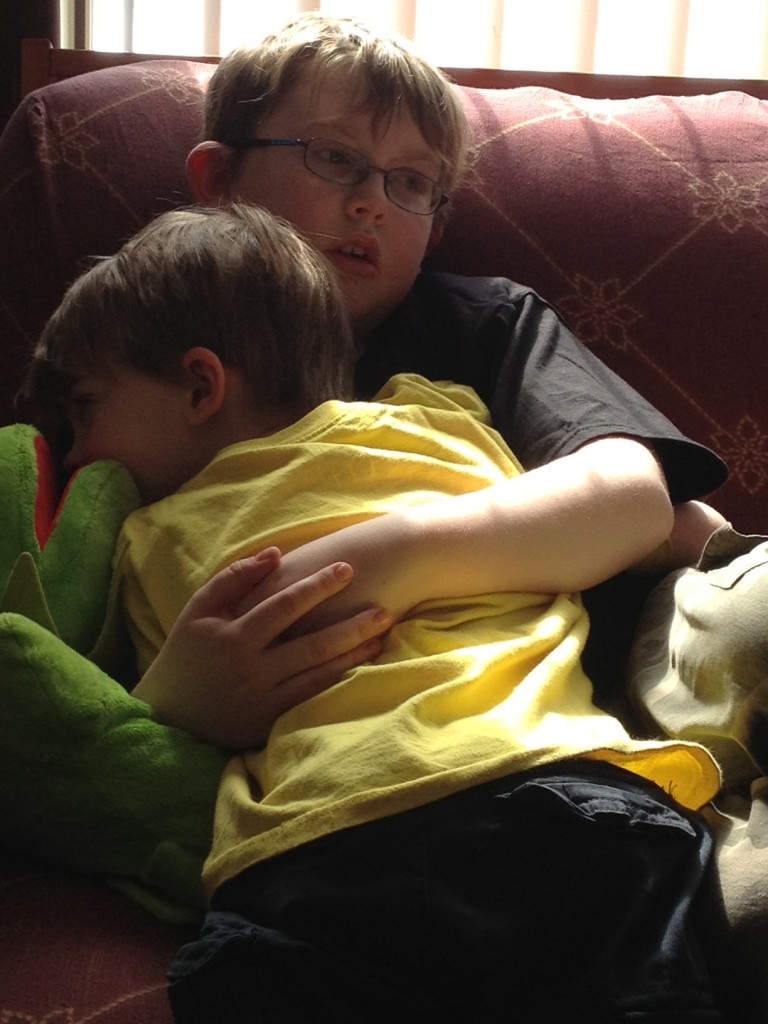
 I know the Internet is designed to inspire fury. That hasn’t been the majority of my experience with it, but lately, it seems determined to correct my underestimation of its rage-inducing qualities.
I know the Internet is designed to inspire fury. That hasn’t been the majority of my experience with it, but lately, it seems determined to correct my underestimation of its rage-inducing qualities. PROBLEM #3: HE THINKS THERE’S ONLY ONE WAY TO PLAY WITH TOY CARS. This one particularly burns my ass, because I know from experience that he’s wrong. When I was a kid, I played with toy cars by lining them up in perfectly symmetrical, parallel rows, sorted by shape, size, and color. Then my sister would walk through the lines like Godzilla, kicking them to kingdom come. And then I would line them up again in different patterns. I picked my favorites by the way they felt in my palm, my closed fist.
PROBLEM #3: HE THINKS THERE’S ONLY ONE WAY TO PLAY WITH TOY CARS. This one particularly burns my ass, because I know from experience that he’s wrong. When I was a kid, I played with toy cars by lining them up in perfectly symmetrical, parallel rows, sorted by shape, size, and color. Then my sister would walk through the lines like Godzilla, kicking them to kingdom come. And then I would line them up again in different patterns. I picked my favorites by the way they felt in my palm, my closed fist.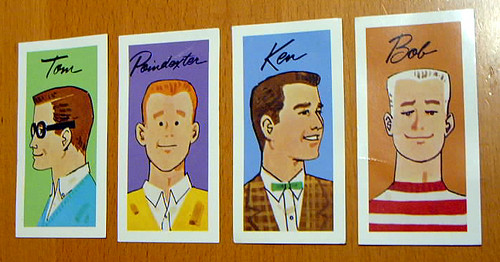
 The time for ritual is at hand. I stand in the place of my power, tools of the magic I will work laid out before me– silver, wood, and steel. Fire and water are at my command, earth and air held back by my will. In this time, I will draw on the forces of creation, shaping elements. Here, I am an alchemist, a hand of the goddess herself.
The time for ritual is at hand. I stand in the place of my power, tools of the magic I will work laid out before me– silver, wood, and steel. Fire and water are at my command, earth and air held back by my will. In this time, I will draw on the forces of creation, shaping elements. Here, I am an alchemist, a hand of the goddess herself. While I am not so bold as to commit to such a statement myself, the power of the kitchen, and what it summons and creates, is not to be denied. Though I began down the path of Wicca in solitude, I learned the magic of cooking as all good magics are best learned : at the elbow of a wise and laughing grandmother. The rules were simple. Wash your hands. Clean as you go. Read the whole recipe before you start. Measure with care. And, most importantly, share the joy as often as possible–that’s why there are always enough beaters and spatulas and bowls for everyone. If you abide by that last rule, no spills or scorches can spell failure. Just vacuum up the oatmeal, wash the egg out of your hair, and laugh about the fun you had.
While I am not so bold as to commit to such a statement myself, the power of the kitchen, and what it summons and creates, is not to be denied. Though I began down the path of Wicca in solitude, I learned the magic of cooking as all good magics are best learned : at the elbow of a wise and laughing grandmother. The rules were simple. Wash your hands. Clean as you go. Read the whole recipe before you start. Measure with care. And, most importantly, share the joy as often as possible–that’s why there are always enough beaters and spatulas and bowls for everyone. If you abide by that last rule, no spills or scorches can spell failure. Just vacuum up the oatmeal, wash the egg out of your hair, and laugh about the fun you had. But I have to be honest about something, and it’ll probably blow the lid right off any sort of “kitchen witch mystique” I may have managed to build. I am no gourmet. I’ve never taken a cooking class. Those brownies which my friends and co-workers steadfastly maintain are the best they’ve ever tasted? Betty Crocker, Fudge Supreme, $2.49 with coupon. That chili whose aroma wafts out like tickling fingers when I open the door on a cold winter night, drawing my husband in all the quicker? Packet of spices, canned beans and tomatoes. Simmer on low for 20 minutes. That’s it. And I’ve never made a secret of it.
But I have to be honest about something, and it’ll probably blow the lid right off any sort of “kitchen witch mystique” I may have managed to build. I am no gourmet. I’ve never taken a cooking class. Those brownies which my friends and co-workers steadfastly maintain are the best they’ve ever tasted? Betty Crocker, Fudge Supreme, $2.49 with coupon. That chili whose aroma wafts out like tickling fingers when I open the door on a cold winter night, drawing my husband in all the quicker? Packet of spices, canned beans and tomatoes. Simmer on low for 20 minutes. That’s it. And I’ve never made a secret of it. So I may not always remember all the poetic invocations when I call the Watchtowers in a Circle, but I remember the favourite food for every loved one in my life, and most of the recipes. And so I might be dreadful at keeping a proper herbal grimoire stocked–my spice racks are the envy of all who survey. I consider myself well on the road to the Lord and Lady’s wisdom, because I know the seat and value of a generous, abundant power within myself, one of the greatest signposts on everyone’s spiritual journey. And when I get there, I’ll be sure to have a dish to pass.
So I may not always remember all the poetic invocations when I call the Watchtowers in a Circle, but I remember the favourite food for every loved one in my life, and most of the recipes. And so I might be dreadful at keeping a proper herbal grimoire stocked–my spice racks are the envy of all who survey. I consider myself well on the road to the Lord and Lady’s wisdom, because I know the seat and value of a generous, abundant power within myself, one of the greatest signposts on everyone’s spiritual journey. And when I get there, I’ll be sure to have a dish to pass.